It's a Bugs Life!

Insects are more important than you think!
Bugs may not be your favorite creatures, but you would not want to live in a world without them. Insects perform five vitally important jobs in the world’s ecosystems:
- Providers of food – many animals eat bugs, and these animals are then eaten by larger animals.
- Decomposers - certain bugs process dead animals, dead plants and excrement, breaking them down so the nutrients can re-enter the ecosystem.
- Pest Controllers – some bugs feed on the bad bugs, thereby controlling them so farmers can use fewer pesticides
- Soil Engineers – bugs such as ants and termites tunnel in the dirt, making it more fertile for crops
- Pollinators – According to Xerces Society Pollinator Conservation Program Co-Director Mace Vaughan, the importance of pollinators (butterflies, bees) cannot be overstated: 85% of flowering plants need an animal (mostly insects) to move pollen from one flower to the next, or from one part of the flower to the next part, to facilitate fertilization which leads to seed and fruit production. Many pollinators are also providers of food for birds!
Just think about all the pollinated, and fertilized, seeds and plants that yield not only fruits, oils, and vegetables, but that feed the livestock from which we get yogurt, milk and cheese. If farmers cannot produce berries, grapes and apples, or alfalfa to feed the cows, they will lose billions of dollars, and our food supply will become very dull and limited. Vaughan goes on to say that “most of our vitamins and minerals actually come from insect pollinated crops.”
Unfortunately, scientists are discovering a worldwide decline in the bug population, and some experts are calling it an “Insect Apocalypse.” We, the humans of the world, have influenced four situations that are threatening insects, including pollinators:
- Habitat loss
- Climate Change
- Plant disease and introduction of non-native plant species
- Use of pesticides
What can we do to encourage the survival of pollinators? Read Nature's Best Hope by Douglas W. Tallamy, on Hoopla, here: https://www.hoopladigital.com and join us for the Examine our Endangered Earth Book Discussion on Wednesday, June 24 @ 6:30 p.m. Please register here: https://brentwood.librarycalendar.com/events/examine-our-endangered-earth-book-club-online-0
In the meantime, avoid chemical pesticides, and plant only native plants to encourage the bees and butterflies. You can use this database as a guide to local native plants: https://www.audubon.org/native-plants What’s good for the bugs is good for the birds!

